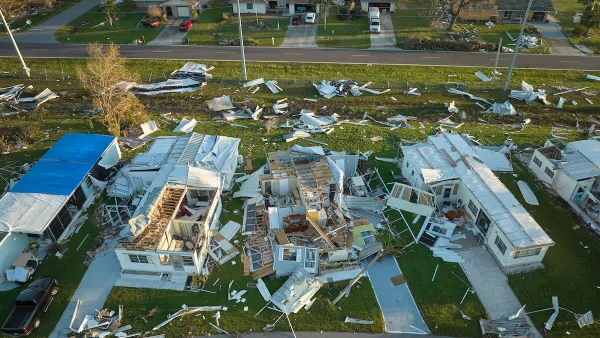Setting insurance rates by looking to the past to predict the future doesn’t make sense with increasing environmental uncertainties, argues the California insurance industry.

Ry Rivard reports that insurance companies in California are arguing that the "new normal" of climate change is altering the insurance landscape. "Near the top of the industry’s wish list is a wonky request: Let insurers set premiums based on the risk of fires that could burn someday soon."
The current approach is to use past losses to predict future ones. But many of the most catastrophic events have happened fairly recently and the frequency and severity of disasters will likely increase in the future. “Since the 1980s, insurers have used increasingly sophisticated computer models to prepare for hurricanes and earthquakes. The California Earthquake Authority, a government-run insurer, uses catastrophe models to set rates, as does a similar effort in Florida to provide hurricane insurance,” writes Rivard.
Critics say that allowing insurers to set rates based on catastrophe models would limit transparency, and they contend that the models do not accurately predict future risks, notes Rivard. "Regulators worry the models aren’t credible, and that they’re a 'black box' and could be used to overcharge consumers."
FULL STORY: Insurance Companies Say They're Not Allowed to Plan for the ‘New Normal’ of Intense Wildfires

Maui's Vacation Rental Debate Turns Ugly
Verbal attacks, misinformation campaigns and fistfights plague a high-stakes debate to convert thousands of vacation rentals into long-term housing.

Planetizen Federal Action Tracker
A weekly monitor of how Trump’s orders and actions are impacting planners and planning in America.

In Urban Planning, AI Prompting Could be the New Design Thinking
Creativity has long been key to great urban design. What if we see AI as our new creative partner?

King County Supportive Housing Program Offers Hope for Unhoused Residents
The county is taking a ‘Housing First’ approach that prioritizes getting people into housing, then offering wraparound supportive services.

Researchers Use AI to Get Clearer Picture of US Housing
Analysts are using artificial intelligence to supercharge their research by allowing them to comb through data faster. Though these AI tools can be error prone, they save time and housing researchers are optimistic about the future.

Making Shared Micromobility More Inclusive
Cities and shared mobility system operators can do more to include people with disabilities in planning and operations, per a new report.
Urban Design for Planners 1: Software Tools
This six-course series explores essential urban design concepts using open source software and equips planners with the tools they need to participate fully in the urban design process.
Planning for Universal Design
Learn the tools for implementing Universal Design in planning regulations.
planning NEXT
Appalachian Highlands Housing Partners
Mpact (founded as Rail~Volution)
City of Camden Redevelopment Agency
City of Astoria
City of Portland
City of Laramie





























